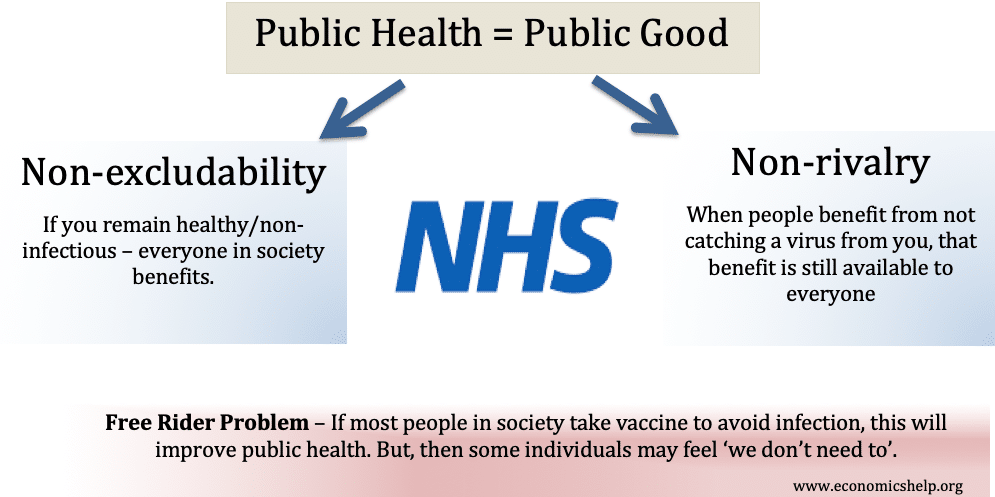Covid raises many problems for society and offers quite a few examples of market failure. These include:
- Externalities. A young person catching Covid may face few personal costs, but there is an external cost because they may transmit to more vulnerable people.
- Information asymmetries. There is a lot of misinformation about Covid and vaccines. This makes it more difficult for individuals and business to make rational decisions.
- Monopoly power. Vaccines patented by large multinationals. Supply is dominated by a few of the richer countries.
- Public good – Improving public health is a public good (non-rivalry/ non-excludable benefits). But, there is an incentive to be a free-rider on other people who make efforts to improve health.
- Inequality. Lockdowns and social restrictions have affected different groups in different ways. Some jobs (typing at home) have done well and workers have increased personal savings. Other sectors of the economy have suffered from economic restrictions and may never recover.
Externalities
Lockdown sceptics argue that it is their individual choice about how to live. That is generally a fair point, but it ignores how certain decisions also affect other people. If we enjoy going out and remaining unvaccinated, we don’t take that decision in isolation. The personal costs may be quite limited (if young and healthy) but, there are also less visible effects on other people. Putting ourselves at risk of catching Covid, increases the chance other people will catch Covid. If they have underlying health conditions, it may lead to their hospitalisation and death. This leads to a chain of external costs to society – health costs, more economic lockdowns, greater unwillingness to return to normal activity. Therefore our freedom to act without constraint impacts on the freedom of other people to live in good health
Vaccine externalities. A person may feel they don’t want to take a vaccine because they think personal costs are greater than personal benefits. But, there is an external benefit from taking a vaccine, in that it reduces transmission to other people, it makes Covid less damaging and in a vaccinated society, we can remove restrictions because the overall health costs are much lower. Therefore, the social benefit of getting vaccinated is greater than the private benefit.
This means that in a free market, we may have under-consumption of vaccines because people ignore the social benefit when deciding what to take.
Information asymmetries
On the internet, there is much conflicting information about Covid. The reasons for this information asymmetries are many.
- Contrarianism. The desire to go against prevailing opinion
- Suspicion of government/big business
- Rewards for influencers to share misinformation about Covid/Vaccines. A Facebook post warning about the dangers of Vaccines with exaggerated, misleading or false examples could go viral and attract a lot of followers. This ‘dramatic’ misinformation gives a financial reward, greater followers and a sense of achievement. Taking a neutral well-balanced approach is less interesting and is rewarded less on the internet.
- Cognitive bias. A person who has a bad reaction to a vaccine and feels ill for a few days may see this as the dominant experience of Covid. It is harder to give the same weighting to a possible outcome you haven’t experienced yet. Similarly, a person who is relatively young and vaccinated but still fears to go out maybe over-exaggerating their risk of Covid.
Monopoly power
In a nutshell, the developed world is getting on top of Covid with rates of vaccination over 70%. Hospitalisation and death rates are lower than at the peak of the crisis. But, for many developing economies, they haven’t been able to access sufficient vaccinations and so the crisis is much more severe. Due to the global nature of the problem, it is in everyone’s interest to tackle Covid across the globe. But because of inequality in buying power, there is a glut of vaccines in the west and a great need for vaccines in the developing world.
Public Good
If we do everything in our power to stop the spread of Covid – wash hands, wear masks, social distance, get tested regularly, get vaccinated, avoid putting others at risk, we contribute towards improved public health. A lower spread of Covid, helps many aspects of society from health to the economy. When we improve public health, we are contributing to a public good. Everyone benefits from your care. Even those who don’t believe in wearing masks or getting vaccines benefit from efforts to reduce the incidence of the disease.
The problem is that there is a free-rider problem. If everyone else takes Covid precautions, you can go out and enjoy yourself and not wear a mask or get vaccinated, but benefit from others who have got vaccinated. However, if many people think like this, then public health suffers.
Inequality
Some people are more insulated from the effects of Covid than others. If you have wealth, a job at home, good underlying health, it is much easier to live under the Covid climate. If you have an underlying health condition, a physical job meeting other people, you are at greater risk. Also, if you have a job in leisure, catering or self-employed, you will have lost income rather than increased savings.

